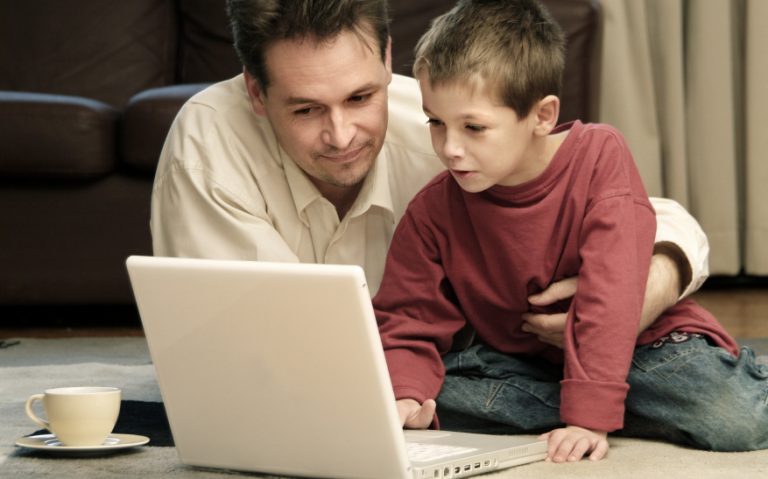
Many parents don`t let their kids use computers until they are school age or even older. I respect this decision, but my philosophy is that if appropriate games and programs are used in the right way ` with` reasonable` boundaries and not to` the exclusion of other play and learning media ` computers are OK at almost any age. Indeed, computer time can be not just fun and instructive, but can contribute to family connectedness.
I avoid computer programs that teach by rote` you might as well just give your child vocabulary or spelling quizzes. Rather, I look for games that capitalize on the power of computers by altering scenarios depending on your child`s input. Computer games can teach dexterity, logic and problem solving, resources management, and many other skills.
Look for games that the adults will enjoy playing with their children (this allows computer games to become family activities). That means games that offer gradations of difficulty. Zoo Tycoon is a good example.` In this game the player builds a zoo, which earns money depending on what animals are on display, how they are cared for, and what amenities the `keeper` provides. A very young child can easily become proficient in an hour or so, but the more sophisticated aspects of the game will challenge older children and adults. At all ages, creating and managing a zoo provides an engaging opportunity for enjoyable learning and interaction.
You must set boundaries regarding the use of technology (and media) and monitor the time spent on any one particular activity. But, if you choose computer games carefully and incorporate them thoughtfully, they can become a very positive part of your family life.
The Pros Of Technology For Children
-
Fine-tune fine-motor skills. Pushing keys and manipulating a mouse gives those chubby toddler hands and fingers the same type of valuable workout they get from finger painting or doodling (though without the creative kick of these more artistic dexterous endeavors). These fine-motor movements also hone eye-hand coordination, and that`ll pay off for years to come as your little one learns to catch a ball, use scissors, or put together a tricky puzzle.
-
Teach cause and effect. It`s no secret that toddlers and preschoolers love playthings they can manipulate (oh, that satisfying sense of control!) like pop-up books and anything with levers, switches, or buttons. That`s why young children and computers work well together ` they dig it when they click on a character or icon (or perhaps choose the right letter or color) and ` voila! ` something happens.
` The Cons Of Technology For Children
-
Not enough people time. Computer games might be interactive, but typically only between the user and the screen. But people ` especially little children ` need to interact with other people to develop empathy, build social skills`and have face-to-face fun! Plus, no educational software can compete with you in the teaching department.
-
Not enough hands-on time. There`s a reason why toddlers touch everything ` and get into everything: That`s the way they learn about the world around them. Whether it`s shoveling sand into a pail (and then dumping it out again), figuring out how to stack three blocks so they don`t tumble down, or mixing water with dirt to make mud (try doing that on a computer screen), a hands-on approach to toddler learning beats high-tech hands down.
-
Too much stimulation. It`s easy for a toddler or preschooler to get overwhelmed by all those sensory effects ` loud sounds, bold colors, flashing lights, and endless action. If your little one seems to get cranky or easily frustrated after a computer session, try scaling back the screen time; instead have him devote more hours to old-fashioned toddler pursuits like taking a scooter spin around the hood, reading a book, or sculpting a clay castle. Another potential problem of mixing young children and computers: Kids who become too dependent on all that stimulation may have trouble later focusing on quieter pastimes (like reading or drawing) and paying attention to less high-tech educational mediums (say, a teacher and a blackboard).
-
Too much sedentary time. Sure, computers are mentally stimulating, but toddlers (and everyone for that matter) need to get moving. Physical play is key to toddler growth ` it helps build strong muscles and it`s a primary way little kids discover what their bodies can do. Plus, habits established early on tend to stick, for better and for worse, so be a good role model: Limit screen time (TV too) and incorporate plenty of physical activity (digging holes, sliding down slides, and freeze-dancing count) into every day.
Questions For Reflection
- How much time do my children spend playing computer games`
- Do I select computer games carefully, looking for nonviolent and educational games that make the most of new technology`
- Do I interact with my children and computer games together`
` Source: 52 Weeks of Parenting Wisdom by Meg Akabas

